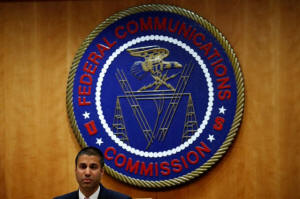|
Trump administration rejects states'
argument on net neutrality
 Send a link to a friend
Send a link to a friend
 [October 02, 2018]
By David Shepardson [October 02, 2018]
By David Shepardson
WASHINGTON (Reuters) - Federal
Communications Commission chairman Ajit Pai rejected arguments Monday
that states should be able to impose their own net neutrality
protections after the Trump administration in December withdrew them.
The Trump administration late on Sunday filed suit seeking a preliminary
injunction to block California's state net neutrality law from taking
effect in January. The court filing came soon after Governor Jerry Brown
signed legislation.
Pai told reporters after an event in Washington the arguments made by
states are "completely baseless" and said the internet is "inherently an
interstate service... From a legal perspective we're on very strong
ground."
In August, 22 states, including California, and a coalition of trade
groups representing major tech companies urged a federal appeals court
to reinstate the rules and said it could not tie states' hands.

"An agency that deems itself to lack statutory authority to regulate a
particular practice altogether cannot rely on the same absence of
authority to preempt state regulation," the states wrote.
This marks the latest clash between the Trump administration and
California, which have sparred over environmental, immigration and other
hot-button issues.
Senator Ed Markey said Monday, "Despite overwhelming bipartisan support
for the open internet, the Trump administration, along with the big
broadband behemoths, will stop at nothing to prevent strong net
neutrality rules from being put on the books on the state and national
levels."
The FCC voted 3-2 in December along party lines to reverse rules that
barred internet service providers from blocking or throttling traffic or
offering paid fast lanes, also known as paid prioritization. The vote
also sought to preempt states from setting their own rules governing
internet access.
[to top of second column]
|

Chairman Ajit Pai speaks ahead of the vote on the repeal of so
called net neutrality rules at the Federal Communications Commission
in Washington, U.S., December 14, 2017. REUTERS/Aaron P. Bernstein

The Trump administration rules were a win for providers like Comcast
Corp, AT&T Inc and Verizon Communications Inc, but the net
neutrality repeal was opposed by internet companies like Facebook
Inc, Amazon.com Inc and Alphabet Inc.
Cox Communications Inc [COXC.UL] President Pat Esser said in an
interview Monday that internet providers are committed to an open
internet but want flexibility to address consumer needs. Esser said
the FCC in 2015 went too far in opening the door to future rate
regulation.
He hopes Congress will codify open internet rules. ISPs are not
going to block or throttle websites. "It's just not good business
practice," Esser said. "It's become a political issue more than a
rational issue."
The U.S. Senate voted in May to reinstate net neutrality rules, but
the measure is unlikely to be approved by the House of
Representatives.
The FCC in December handed ISPs sweeping new powers to recast how
Americans use the internet, as long as they disclose changes. The
new rules took effect in June but providers have made no changes.
(Reporting by David Shepardson; Editing by Cynthia Osterman)
[© 2018 Thomson Reuters. All rights
reserved.]
Copyright 2018 Reuters. All rights reserved. This material may not be published,
broadcast, rewritten or redistributed.
Thompson Reuters is solely responsible for this content.
 |